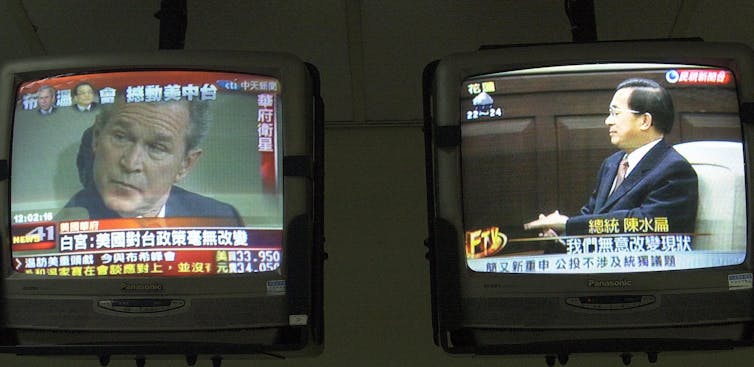Sometimes, superpowers have a hard time getting smaller allies to do what they want with the assistance they provide. Often, it is to the detriment of the larger power’s interests.
The United States has faced a fair bit of this in recent decades. In Africa, U.S. partners Chad, Niger and Burkina Faso have diverted U.S. security assistance and training intended for counterterrorism toward suppression of political opponents, or for military coups that undermined human rights and only increased the risk of terrorism.
Similarly, Saudi Arabia in the 2010s used U.S. military support meant to shore up Saudi security against Iran to enter and expand a brutal war in Yemen that ended up strengthening the same Houthi rebels who are today attacking U.S. warships in the Red Sea.
Political scientists have a term that covers this phenomenon: moral hazard. It defines a dynamic whereby a great power’s commitment to protect an ally with a revisionist streak – that is, a wayward ally seeking to alter the status quo or shake up the settled order– insulates the ally from the risks of its own behavior, thus encouraging reckless actions.
And nowhere is moral hazard causing Washington more of a headache than in the Middle East. Enabled by the massive security umbrella and ironclad support offered by the United States, Israel has over the past year ignored or undermined U.S. pressure to moderate the war in Gaza – and now, Lebanon.
As an expert on alliances and the Middle East region, I know the costs to the United States have already been high, and will almost certainly go higher if Israel continues to escalate hostilities – potentially bringing Iran into a hot war from its position largely on the sidelines. What appears to be lacking in the U.S.’s inability to have Israel accede to its pleas to de-escalate is another geopolitical concept that has, it is argued, worked elsewhere: strategic ambiguity.
No dent in US’s ironclad support
The two core components to moral hazard – an ally seeking to alter the status quo and a firm great-power pledge to that ally’s defense – stand at the center of the U.S.-Israel relationship.
Since the Hamas-led attack on Israel on Oct. 7, 2023, U.S. President Joe Biden has repeatedly reaffirmed America’s “ironclad commitment to the security of Israel.”
For its part, Israel has signaled its intention to destroy Hamas – and perhaps now, Hezbollah – militarily and reestablish the impregnable deterrence Israel felt it lost with the Hamas attack.
“We will take whatever action is necessary to restore security,” Israeli Prime Minister Benjamin Netanyahu said recently.
This mix of a rock-solid U.S. security pledge and Israeli intent to utterly degrade its enemies is, I believe, fueling a moral hazard that sees Israeli actions seemingly at odds with U.S. wishes.

For example, shortly after the Oct. 7 attack, Biden told Israel to pursue surgical strikes and avoid a major ground invasion in northern Gaza. Two weeks later, Israel did the opposite, launching its brutally destructive campaign.
Then on May 5, 2024, Biden told Netanyahu that invading Rafah would be crossing a “red line.” The next day, Israel did just that.
Meanwhile, attempts by Washington to broker a cease-fire in Gaza and prevent a war with Hezbollah in Lebanon have been repeatedly undermined by Israeli assassinations, pager strikes and intransigence at the negotiating table.
The U.S. government has expressed frustration with the Israeli government’s refusal to listen to its much larger ally. But at the same time, Washington has done very little to suggest that it would ever dent its resolve to protect Israel, no matter what.
The cost of this moral hazard to the U.S. is already evident. Washington has sent billions of dollars in new security assistance to Israel, while sending additional U.S. forces to the region and defending Israel for the first time ever from a direct attack by Iran. Meanwhile, three Americans have died and many more wounded in the more than 200 missile attacks by Iranian-backed proxies as a result of the escalation of conflict.
And a higher cost may come. From the outset, there have been fears that the conflict in Gaza could lead to a full-blown regional war, with Iran entering the fighting in a meaningful way.
Iran has appeared reluctant to do so, but it is notable that its sporadic missile strikes on Israel have followed Israeli actions that have been carried out seemingly without the blessing of its U.S. protector: first, in response to a purported Israeli missile strike on its embassy compound in Damascus, and then in response to a major offensive against Tehran’s main proxy in the region, Hezbollah.
A Taiwan model for Israel?
The point isn’t whether Israel is right or wrong in defending itself, but that it is acting without the apparent consent of the U.S., and often against Washington’s expressed wishes. Moreover, Israel is doing so knowing its actions will do nothing to erode the U.S. protection that insulates Israel from the full consequences of its actions.
So, what would mitigate this geopolitical moral hazard? The answer, I believe, is strategic ambiguity. When great powers make their commitments to allies more ambiguous, allies are forced to think twice about behaving in ways that may be reckless.
The classic example is the U.S. security commitment to Taiwan.
In the early 2000s, the Bush administration tightened its commitment to defend Taiwan against an invasion by Communist China and enhance Taipei’s sense of security. The move backfired; Taiwan’s president, Chen Shui-bian, used the U.S. pledge to start a campaign for Taiwanese independence, which significantly ratcheted up tension with China and for a time deepened hostility between Beijing and Washington.

To tamp down Taiwanese moral hazard, the Bush administration moved back to the strategic ambiguity that had governed the U.S.’s China policy since the 1970s. Bush did this by publicly stating in 2003 his opposition to changing the status quo by either China or Taiwan. He then refused to specify what constituted a violation of the status quo or what the U.S. would do to stop it.
The ambiguity worked: Taiwan backed away from independence, and tensions with China calmed.
Taiwan-style strategic ambiguity might, I believe, offer a better model for the Middle East today. Replacing the current “ironclad” commitment to defend Israel no matter what with a less certain pledge where the U.S. merely “reserves the right” to defend Israel at the U.S.’s choosing might provide more heft to the warnings against escalation uttered in Washington but so far ignored in Israel.

 German (DE)
German (DE)  English (US)
English (US)  Spanish (ES)
Spanish (ES)  French (FR)
French (FR)  Hindi (IN)
Hindi (IN)  Italian (IT)
Italian (IT)  Russian (RU)
Russian (RU)  4 hours ago
4 hours ago
























Comments